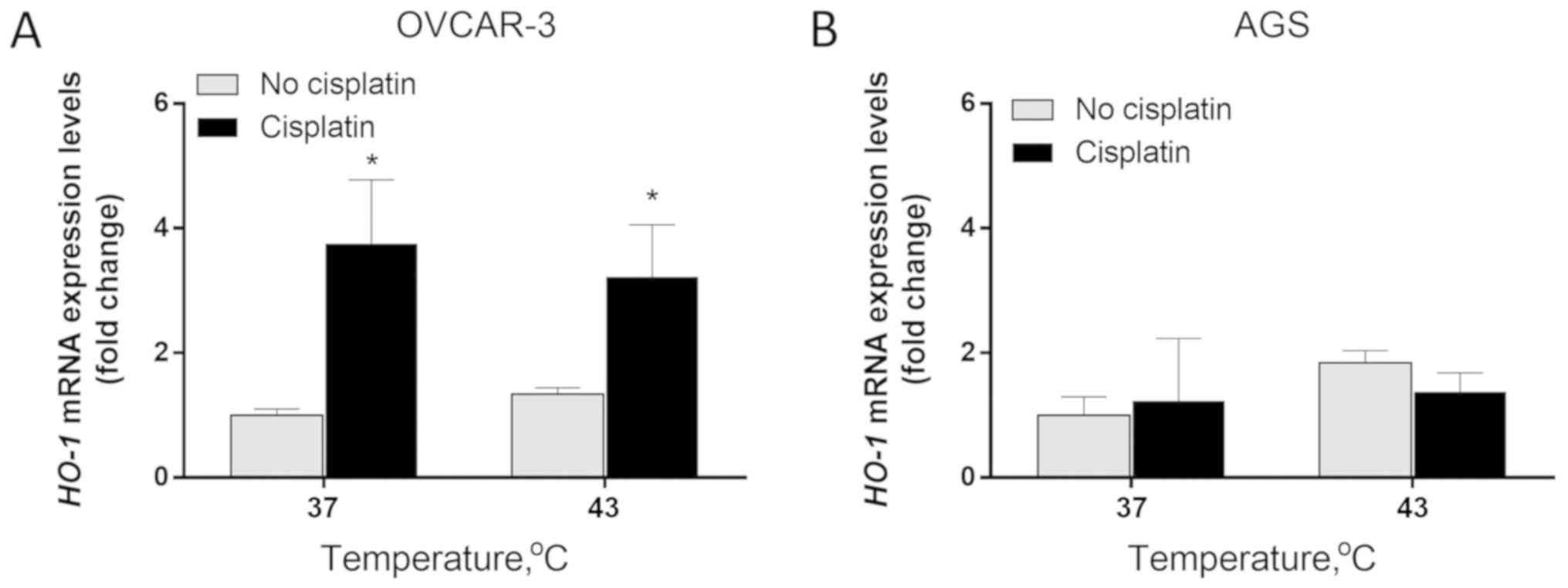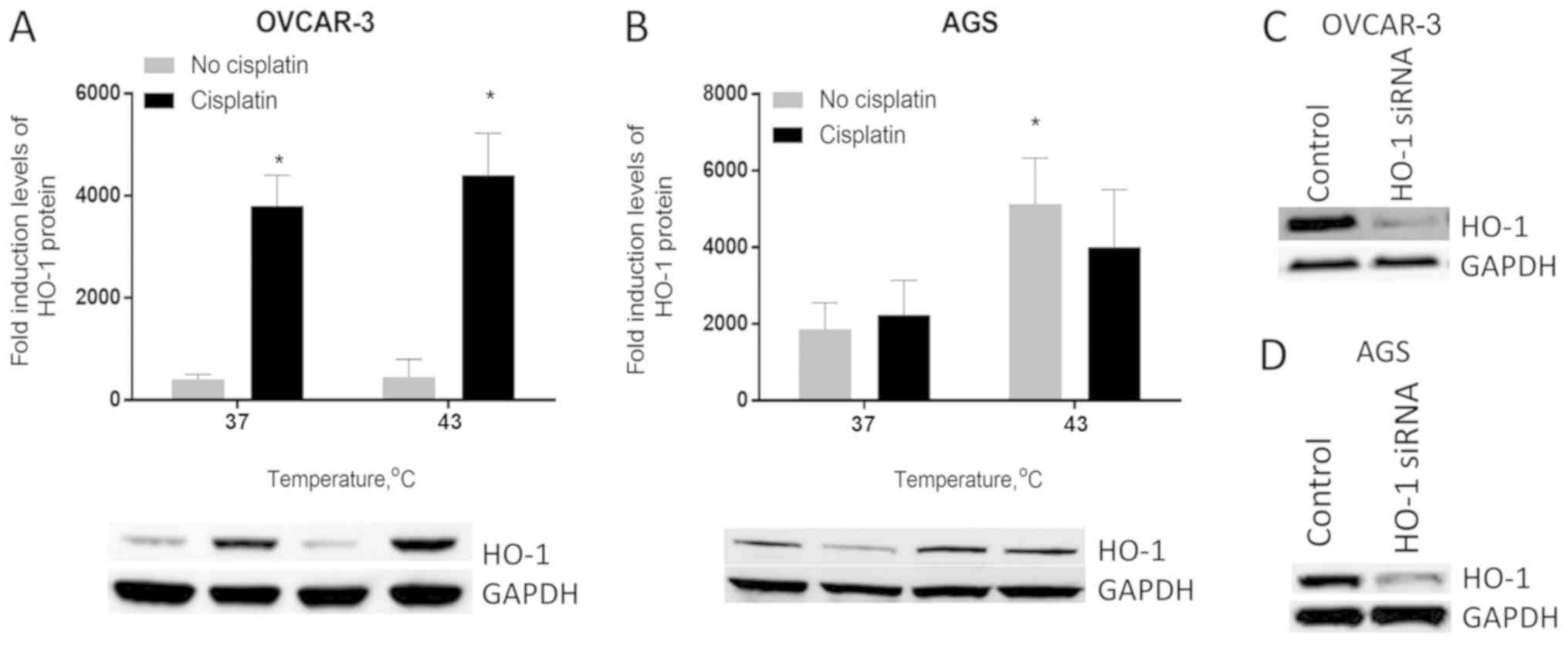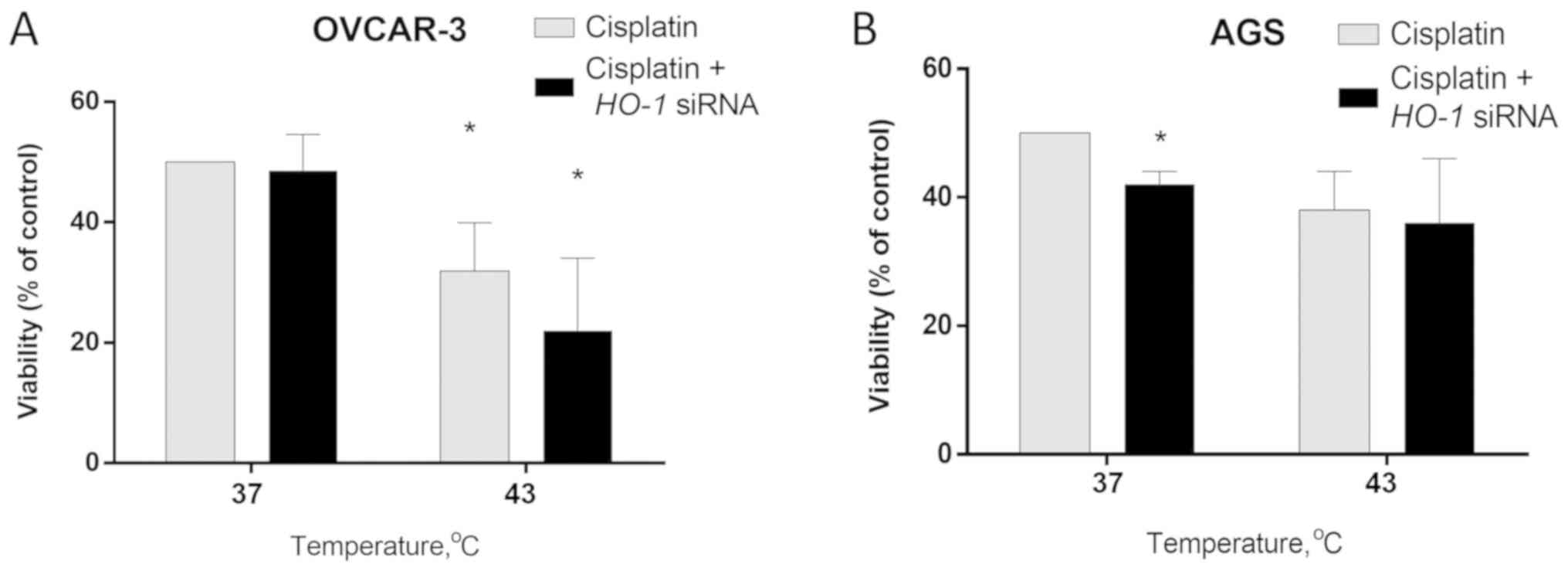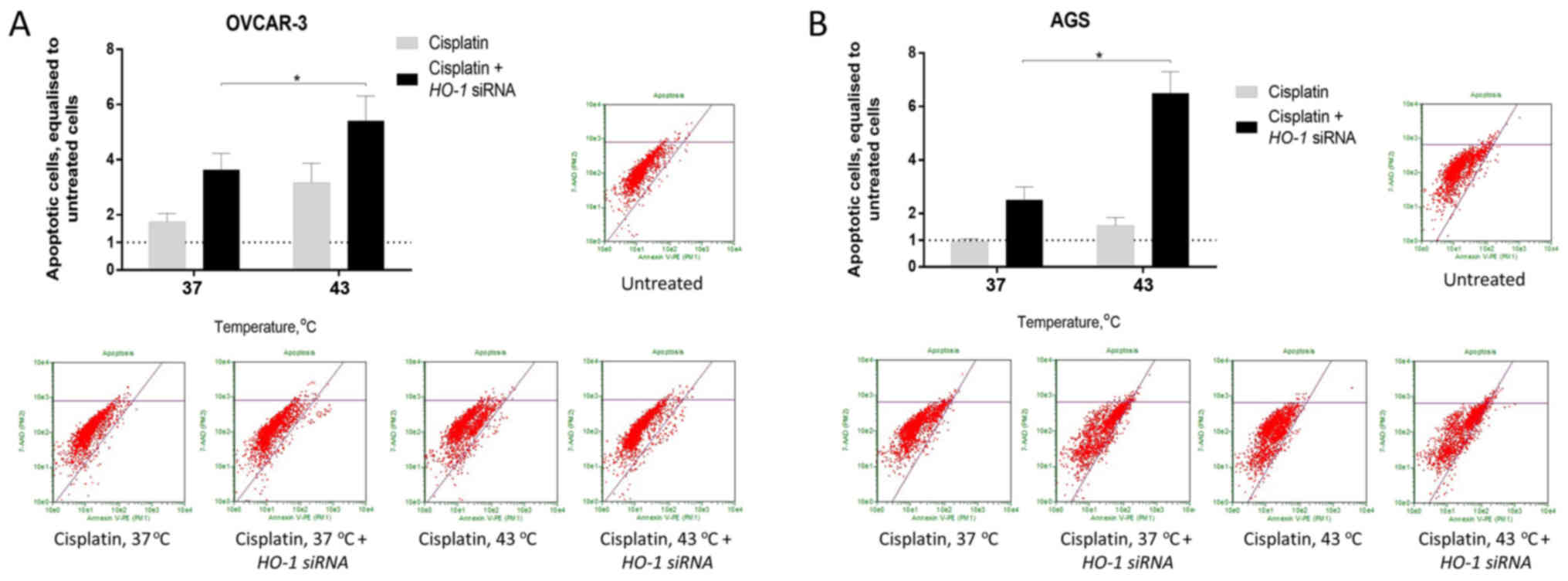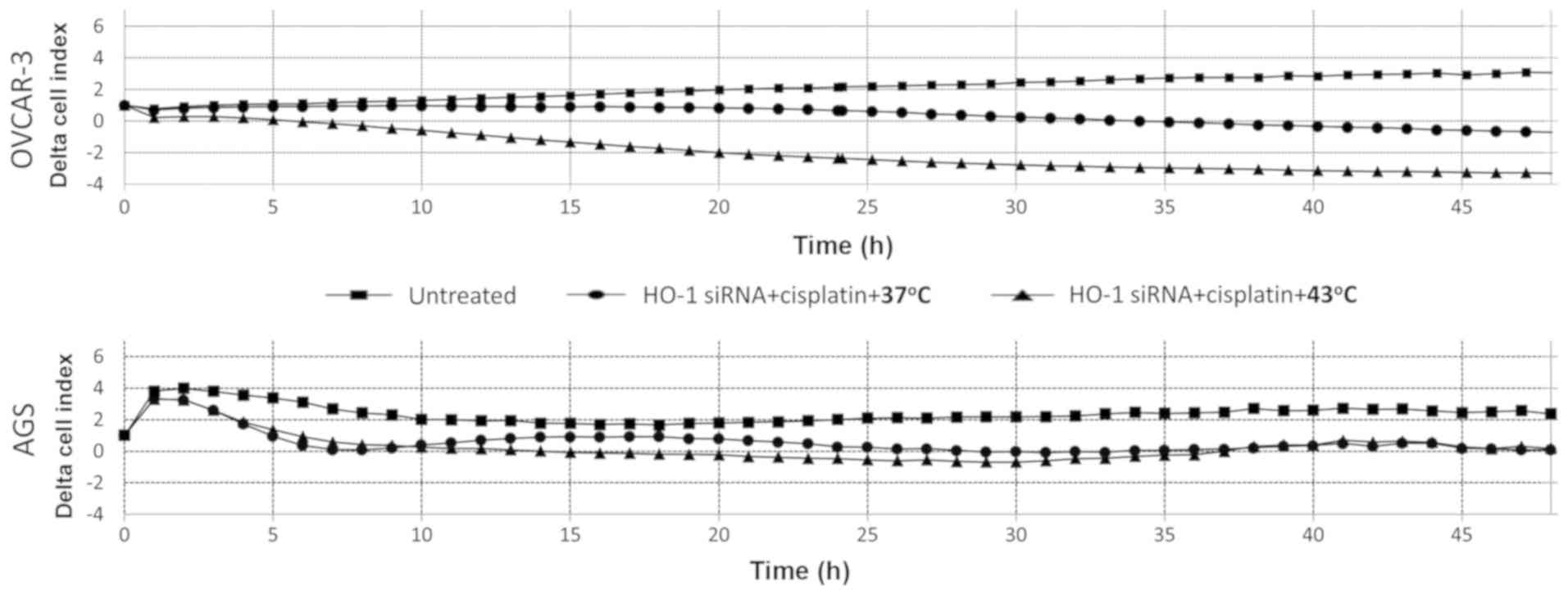|
1
|
Shariff U, Seretis C and Youssef H:
Management of colorectal cancer patients at high risk of peritoneal
metastases. J BUON. 20 (Suppl 1):S71–S79. 2015.PubMed/NCBI
|
|
2
|
Zivanovic O, Chi DS, Filippova O, Randall
LM, Bristow RE and O'Cearbhaill RE: It's time to warm up to
hyperthermic intraperitoneal chemotherapy for patients with ovarian
cancer. Gynecol Oncol. 151:555–561. 2018. View Article : Google Scholar : PubMed/NCBI
|
|
3
|
Yonemura Y, Endou Y, Sasaki T, Hirano M,
Mizumoto A, Matsuda T, Takao N, Ichinose M, Miura M and Li Y:
Surgical treatment for peritoneal carcinomatosis from gastric
cancer. Eur J Surg Oncol. 36:1131–1138. 2010. View Article : Google Scholar : PubMed/NCBI
|
|
4
|
Stewart JH IV, Shen P and Levine EA:
Intraperitoneal hyperthermic chemotherapy for peritoneal surface
malignancy: Current status and future directions. Ann Surg Oncol.
12:765–777. 2005. View Article : Google Scholar : PubMed/NCBI
|
|
5
|
Stirrups R: HIPEC improves survival in
stage III epithelial ovarian cancer. Lancet Oncol. 19:e1382018.
View Article : Google Scholar : PubMed/NCBI
|
|
6
|
Tentes AA, Pallas N, Karamveri C,
Kyziridis D and Hristakis C: Cytoreduction and HIPEC for peritoneal
carcinomatosis of pancreatic cancer. J BUON. 23:482–487.
2018.PubMed/NCBI
|
|
7
|
Tonello M, Ortega-Perez G, Alonso-Casado
O, Torres-Mesa P, Guiñez G and Gonzalez-Moreno S: Peritoneal
carcinomatosis arising from rectal or colonic adenocarcinoma
treated with cytoreductive surgery (CRS) hyperthermic
intraperitoneal chemotherapy (HIPEC): Two different diseases. Clin
Transl Oncol. 20:1268–1273. 2018. View Article : Google Scholar : PubMed/NCBI
|
|
8
|
Jacquet P and Sugarbaker PH:
Peritoneal-plasma barrier. Cancer Treat Res. 82:53–63. 1996.
View Article : Google Scholar : PubMed/NCBI
|
|
9
|
Markman M: Intraperitoneal chemotherapy in
the management of malignant disease. Expert Rev Anticancer Ther.
1:142–148. 2001. View Article : Google Scholar : PubMed/NCBI
|
|
10
|
Helm CW: The role of hyperthermic
intraperitoneal chemotherapy (HIPEC) in ovarian cancer. Oncologist.
14:683–694. 2009. View Article : Google Scholar : PubMed/NCBI
|
|
11
|
Dovern E, de Hingh IH, Verwaal VJ, van
Driel WJ and Nienhuijs SW: Hyperthermic intraperitoneal
chemotherapy added to the treatment of ovarian cancer. a review of
achieved results and complications. Eur J Gynaecol Oncol.
31:256–261. 2010.PubMed/NCBI
|
|
12
|
Zhu Y, Hanna N, Boutros C and Alexander HR
Jr: Assessment of clinical benefit and quality of life in patients
undergoing cytoreduction and Hyperthermic Intraperitoneal
Chemotherapy (HIPEC) for management of peritoneal metastases. J
Gastrointest Oncol. 4:62–71. 2013.PubMed/NCBI
|
|
13
|
van de Vaart PJ, van der Vange N,
Zoetmulder FA, van Goethem AR, van Tellingen O, ten Bokkel Huinink
WW, Beijnen JH, Bartelink H and Begg AC: Intraperitoneal cisplatin
with regional hyperthermia in advanced ovarian cancer:
pharmacokinetics and cisplatin-DNA adduct formation in patients and
ovarian cancer cell lines. Eur J Cancer. 34:148–154. 1998.
View Article : Google Scholar : PubMed/NCBI
|
|
14
|
Yan TD, Cao CQ and Munkholm-Larsen S: A
pharmacological review on intraperitoneal chemotherapy for
peritoneal malignancy. World J Gastrointest Oncol. 2:109–116. 2010.
View Article : Google Scholar : PubMed/NCBI
|
|
15
|
Kimura E and Howell SB: Analysis of the
cytotoxic interaction between cisplatin and hyperthermia in a human
ovarian carcinoma cell line. Cancer Chemother Pharmacol.
32:419–424. 1993. View Article : Google Scholar : PubMed/NCBI
|
|
16
|
Sukovas A, Cesna V, Jasukaitiene A,
Barauskas G, Nadisauskiene RJ, Dambrauskas Z, Paskauskas S and
Gulbinas A: Response of OVCAR-3 cells to cisplatin and
hyperthermia: does hyperthermia really matter? Anticancer Res.
37:5011–5018. 2017.PubMed/NCBI
|
|
17
|
Leung AW, Hung SS, Backstrom I, Ricaurte
D, Kwok B, Poon S, McKinney S, Segovia R, Rawji J, Qadir MA, et al:
Combined use of gene expression modeling and siRNA screening
identifies genes and pathways which enhance the activity of
cisplatin when added at no effect levels to non-small cell lung
cancer cells in vitro. PLoS One. 11:e01506752016. View Article : Google Scholar : PubMed/NCBI
|
|
18
|
Skowron MA, Niegisch G, Albrecht P, van
Koeveringe G, Romano A, Albers P, Schulz WA and Hoffmann MJ:
Various mechanisms involve the nuclear factor (erythroid-derived
2)-like (NRF2) to achieve cytoprotection in long-term
cisplatin-treated urothelial carcinoma cell lines. Int J Mol Sci.
18(pii): E16802017. View Article : Google Scholar : PubMed/NCBI
|
|
19
|
Kumar S, Stokes J III, Singh UP, Scissum
Gunn K, Acharya A, Manne U and Mishra M: Targeting Hsp70: a
possible therapy for cancer. Cancer Lett. 374:156–166. 2016.
View Article : Google Scholar : PubMed/NCBI
|
|
20
|
Thul PJ, Åkesson L, Wiking M, Mahdessian
D, Geladaki A, Ait Blal H, Alm T, Asplund A, Björk L, Breckels LM,
et al: A subcellular map of the human proteome. Science. 356(pii):
eaal33212017. View Article : Google Scholar : PubMed/NCBI
|
|
21
|
Rushworth SA and O'Connell MA: Haem
oxygenase-1 in inflammation. Biochem Soc Trans. 32:1093–1094. 2004.
View Article : Google Scholar : PubMed/NCBI
|
|
22
|
Nemmiche S, Chabane-Sari D, Kadri M and
Guiraud P: Cadmium-induced apoptosis in the BJAB human B cell line:
involvement of PKC/ERK1/2/JNK signaling pathways in HO-1
expression. Toxicology. 300:103–111. 2012. View Article : Google Scholar : PubMed/NCBI
|
|
23
|
Shibahara S, Müller RM and Taguchi H:
Transcriptional control of rat heme oxygenase by heat shock. J Biol
Chem. 262:12889–12892. 1987.PubMed/NCBI
|
|
24
|
Vile GF, Basu-Modak S, Waltner C and
Tyrrell RM: Heme oxygenase 1 mediates an adaptive response to
oxidative stress in human skin fibroblasts. Proc Natl Acad Sci USA.
91:2607–2610. 1994. View Article : Google Scholar : PubMed/NCBI
|
|
25
|
Yang RC, Chang CY, Lu TS and Chen SC:
Effects of hyperthermia pretreatment on expression of heme
oxygenase-1 and nitric oxide synthase in rats subjected to
experimental anaphylactic shock. Chin J Physiol. 48:193–199.
2005.PubMed/NCBI
|
|
26
|
Berberat PO, Dambrauskas Z, Gulbinas A,
Giese T, Giese N, Künzli B, Autschbach F, Meuer S, Büchler MW and
Friess H: Inhibition of heme oxygenase-1 increases responsiveness
of pancreatic cancer cells to anticancer treatment. Clin Cancer
Res. 11:3790–3798. 2005. View Article : Google Scholar : PubMed/NCBI
|
|
27
|
Schneider CA, Rasband WS and Eliceiri KW:
NIH Image to ImageJ: 25 years of image analysis. Nat Methods.
9:671–675. 2012. View Article : Google Scholar : PubMed/NCBI
|
|
28
|
Ke N, Wang X, Xu X and Abassi YA: The
xCELLigence system for real-time and label-free monitoring of cell
viability. Methods Mol Biol. 740:33–43. 2011. View Article : Google Scholar : PubMed/NCBI
|
|
29
|
Kang LY, Mok KT, Liu SI, Tsai CC, Wang BW,
Chen IS, Chen YC, Chang BM and Chou NH: Intraoperative hyperthermic
intraperitoneal chemotherapy as adjuvant chemotherapy for advanced
gastric cancer patients with serosal invasion. J Chin Med Assoc.
76:425–431. 2013. View Article : Google Scholar : PubMed/NCBI
|
|
30
|
Halkia E and Spiliotis J: The role of
cytoreductive surgery and HIPEC in epithelial ovarian cancer. J
BUON. 20 (Suppl 1):S12–S28. 2015.PubMed/NCBI
|
|
31
|
Cesna V, Sukovas A, Jasukaitiene A,
Naginiene R, Barauskas G, Dambrauskas Z, Paskauskas S and Gulbinas
A: Narrow line between benefit and harm: additivity of hyperthermia
to cisplatin cytotoxicity in different gastrointestinal cancer
cells. World J Gastroenterol. 24:1072–1083. 2018. View Article : Google Scholar : PubMed/NCBI
|
|
32
|
Papatheodorou I, Fonseca NA, Keays M, Tang
YA, Barrera E, Bazant W, Burke M, Füllgrabe A, Fuentes AM, George
N, et al: Expression Atlas: gene and protein expression across
multiple studies and organisms. Nucleic Acids Res. 46(D1):
D246–D251. 2018. View Article : Google Scholar : PubMed/NCBI
|
|
33
|
Nitti M, Piras S, Marinari UM, Moretta L,
Pronzato MA and Furfaro AL: HO-1 induction in cancer progression: a
matter of cell adaptation. Antioxidants (Basel). 6(pii): E292017.
View Article : Google Scholar : PubMed/NCBI
|
|
34
|
Chau LY: Heme oxygenase-1: Emerging target
of cancer therapy. J Biomed Sci. 22:222015. View Article : Google Scholar : PubMed/NCBI
|
|
35
|
Wang TY, Liu CL, Chen MJ, Lee JJ, Pun PC
and Cheng SP: Expression of haem oxygenase-1 correlates with tumour
aggressiveness and BRAF V600E expression in thyroid cancer.
Histopathology. 66:447–456. 2015. View Article : Google Scholar : PubMed/NCBI
|
|
36
|
Loboda A, Jozkowicz A and Dulak J: HO-1/CO
system in tumor growth, angiogenesis and metabolism-Targeting HO-1
as an anti-tumor therapy. Vascul Pharmacol. 74:11–22. 2015.
View Article : Google Scholar : PubMed/NCBI
|
|
37
|
Was H, Dulak J and Jozkowicz A: Heme
oxygenase-1 in tumor biology and therapy. Curr Drug Targets.
11:1551–1570. 2010. View Article : Google Scholar : PubMed/NCBI
|
|
38
|
Becker JC, Fukui H, Imai Y, Sekikawa A,
Kimura T, Yamagishi H, Yoshitake N, Pohle T, Domschke W and
Fujimori T: Colonic expression of heme oxygenase-1 is associated
with a better long-term survival in patients with colorectal
cancer. Scand J Gastroenterol. 42:852–858. 2007. View Article : Google Scholar : PubMed/NCBI
|
|
39
|
Goodman AI, Choudhury M, da Silva JL,
Schwartzman ML and Abraham NG: Overexpression of the heme oxygenase
gene in renal cell carcinoma. Proc Soc Exp Biol Med. 214:54–61.
1997. View Article : Google Scholar : PubMed/NCBI
|
|
40
|
Maines MD and Abrahamsson PA: Expression
of heme oxygenase-1 (HSP32) in human prostate: normal,
hyperplastic, and tumor tissue distribution. Urology. 47:727–733.
1996. View Article : Google Scholar : PubMed/NCBI
|
|
41
|
Lv X, Song DM, Niu YH and Wang BS:
Inhibition of heme oxygenase-1 enhances the chemosensitivity of
laryngeal squamous cell cancer Hep-2 cells to cisplatin. Apoptosis.
21:489–501. 2016. View Article : Google Scholar : PubMed/NCBI
|
|
42
|
Jeon WK, Hong HY, Seo WC, Lim KH, Lee HY,
Kim WJ, Song SY and Kim BC: Smad7 sensitizes A549 lung cancer cells
to cisplatin-induced apoptosis through heme oxygenase-1 inhibition.
Biochem Biophys Res Commun. 420:288–292. 2012. View Article : Google Scholar : PubMed/NCBI
|
|
43
|
Gozzelino R, Jeney V and Soares MP:
Mechanisms of cell protection by heme oxygenase-1. Annu Rev
Pharmacol Toxicol. 50:323–354. 2010. View Article : Google Scholar : PubMed/NCBI
|
|
44
|
Ewing JF, Haber SN and Maines MD: Normal
and heat-induced patterns of expression of heme oxygenase-1 (HSP32)
in rat brain: Hyperthermia causes rapid induction of mRNA and
protein. J Neurochem. 58:1140–1149. 1992. View Article : Google Scholar : PubMed/NCBI
|
|
45
|
Choi AM and Alam J: Heme oxygenase-1:
Function, regulation, and implication of a novel stress-inducible
protein in oxidant-induced lung injury. Am J Respir Cell Mol Biol.
15:9–19. 1996. View Article : Google Scholar : PubMed/NCBI
|
|
46
|
Zhao Z, Xu Y, Lu J, Xue J and Liu P: High
expression of HO-1 predicts poor prognosis of ovarian cancer
patients and promotes proliferation and aggressiveness of ovarian
cancer cells. Clin Transl Oncol. 20:491–499. 2018. View Article : Google Scholar : PubMed/NCBI
|
|
47
|
Doi K, Akaike T, Fujii S, Tanaka S, Ikebe
N, Beppu T, Shibahara S, Ogawa M and Maeda H: Induction of haem
oxygenase-1 nitric oxide and ischaemia in experimental solid
tumours and implications for tumour growth. Br J Cancer.
80:1945–1954. 1999. View Article : Google Scholar : PubMed/NCBI
|
|
48
|
Nuhn P, Künzli BM, Hennig R, Mitkus T,
Ramanauskas T, Nobiling R, Meuer SC, Friess H and Berberat PO: Heme
oxygenase-1 and its metabolites affect pancreatic tumor growth in
vivo. Mol Cancer. 8:372009. View Article : Google Scholar : PubMed/NCBI
|
|
49
|
Kongpetch S, Kukongviriyapan V, Prawan A,
Senggunprai L, Kukongviriyapan U and Buranrat B: Crucial role of
heme oxygenase-1 on the sensitivity of cholangiocarcinoma cells to
chemotherapeutic agents. PLoS One. 7:e349942012. View Article : Google Scholar : PubMed/NCBI
|
|
50
|
Gueron G, Giudice J, Valacco P, Paez A,
Elguero B, Toscani M, Jaworski F, Leskow FC, Cotignola J, Marti M,
et al: Heme-oxygenase-1 implications in cell morphology and the
adhesive behavior of prostate cancer cells. Oncotarget.
5:4087–4102. 2014. View Article : Google Scholar : PubMed/NCBI
|
|
51
|
Barry MA, Behnke CA and Eastman A:
Activation of programmed cell death (apoptosis) by cisplatin, other
anticancer drugs, toxins and hyperthermia. Biochem Pharmacol.
40:2353–2362. 1990. View Article : Google Scholar : PubMed/NCBI
|
|
52
|
Geske FJ, Lieberman R, Strange R and
Gerschenson LE: Early stages of p53-induced apoptosis are
reversible. Cell Death Differ. 8:182–191. 2001. View Article : Google Scholar : PubMed/NCBI
|















